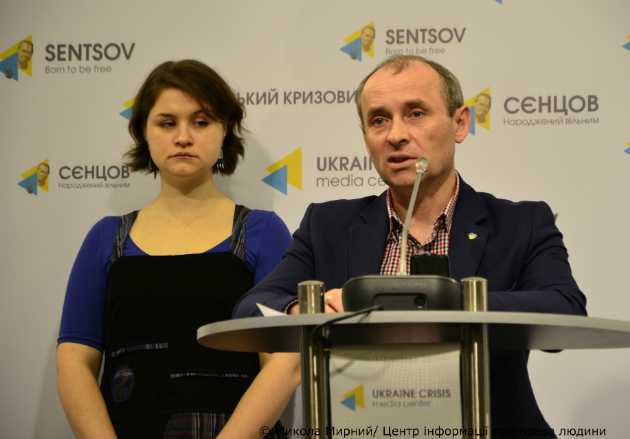Нuman rights activists demand changing the existing procedure for entry to Crimea

The existing procedure for entry to Crimea creates sufficient barriers to human rights and journalistic activities on the peninsula. The human rights activists demand to change it.
This is reported by the Human Rights Information Center correspondent.
June 4, 2015, the Cabinet of Ministers of Ukraine adopted the resolution No. 367 to regulate the procedure for entry to and exit from the temporarily occupied territory of the Autonomous Republic of Crimea.
However, due to termination of the transport connection with Crimea in December 2014, the adoption of this procedure launched a sufficient blow to the opportunities to visit Crimea for Ukrainians and made the work of foreign journalists and human rights defenders on the peninsula virtually impossible.
The Cabinet’s attempt to remedy the situation with the adoption of the resolution No. 722 dated September 16, 2015, which amended the procedure, somewhat eased tensions but had no significant impact on the situation, the human rights activists claim.
“The state of Ukraine, which cannot protect the rights of its citizens in the territory of the Crimean peninsula, often puts insurmountable barriers to those who are willing to do this – for example, to representatives of the international human rights missions and foreign journalists. Instead of informing, monitoring the situation and protecting human rights in Crimea, they have to waste time dealing with the Ukrainian bureaucracy. Moreover, some categories of citizens, for example, the Russian lawyers, who are the only people able to protect Ukrainian citizens in Crimean courts, are not mentioned in the procedure. All their trips to Crimea are beyond Ukrainian legal field,” Chair of the Board of the Human Rights Information Center Tetiana Pechonchyk said.
Oleksandra Romantsova, the project coordinator at the Center for Civil Liberties, told about the problems faced by foreigners wishing to get special permits to enter Crimea under the Ukrainian law. So, all the documents should be submitted in the Ukrainian language. There is no possibility to apply through the consular offices of Ukraine abroad and a foreigner will have to come personally (often – more than once). In addition, there is no possibility to apply online.
Moreover, certain categories of foreigners must also obtain permission letters. The journalists must get such letters from the Information Policy Ministry of Ukraine, the religious leaders – from the Culture Ministry, the human rights activists – from the Foreign Ministry. In practice, the receipt of such a letter of support from the Foreign Ministry took about a month.
“The existing procedure has led to the fact that foreign nationals go through Russia in most cases and do not even try to coordinate their travels with the Ukrainian authorities. Almost no one, except for some of our fellow human rights defenders, preoccupies with passing this procedure,” Oleksandra Romantsova said.
The human rights activists are indignant by the fact that those, who honestly try to follow this order and spend time and resources to obtain special Ukrainian permission to enter Crimea, do not get the necessary assistance, face the bureaucratic complications and are even refused.
Dmitry Makarov, the human rights activist from Russia, who worked as part of the Crimean Human Rights Field Missions for two years and often went to Crimea to document the violations, is among them. The Crimean Human Rights Field Missions is the only consistent effective international civil initiative and the only reliable source for all the international organizations.
His first permission after the introduction of the resolution was issued for 90 days in autumn 2015. The process of receiving took a total of three months. When Makarov re-applied for a new permit in January 2016, he was refused.
“The existing procedure declares its goal as the protection of human rights in the temporarily occupied territories, but it actually complicates the human rights activity in Crimea. In addition, there is no legal possibility to get to Crimea when there is a need for emergency response (e.g. urgent trips to court hearings, trips to document the mass searches in hot pursuit or urgent journalistic coverage of the events),” Dmitry Makarov said.
According to Roman Martynovsky, the lawyer and the human rights expert at the Regional Human Rights Center, Ukrainian human rights activists challenged the resolution of the Cabinet of Ministers No. 367 in the court.
“”The main arguments in favor of the abolition of this order lies in the fact that the Cabinet exceeded its authority in passing the said legal act as it violates the right of citizens to freedom of movement and is disproportionate in relation to the goal of interference,” Roman Martynovsky said.
The District Administrative Court of Kyiv and the Kyiv Administrative Court of Appeal refused to uphold the demands of the human rights defenders and to cancel the resolution of the Cabinet of Ministers. The case is currently pending consideration at the Supreme Administrative Court of Ukraine.
“We do not harbor any illusions that we can achieve a cancelation of this procedure in the Ukrainian courts. We expect to be able to obtain justice in the European Court of Human Rights,” Roman Martynovsky predicts.
“We demand to simplify the procedure both for citizens of Ukraine and foreigners, changing it from permit to notification. Second, it is necessary to allow applying not only in Ukrainian but also in English and other languages. Third, an opportunity should be given to submit the documents not just in Ukraine, spending a lot of time for travel, but through the consular offices of Ukraine abroad as well. Fourth, the list of categories of Ukrainian citizens and foreigners, who may be granted such a permit, should be expanded,” Tetiana Pechonchyk summed up.
Earlier, Ukrainian Parliament Commissioner for Human Rights Valeria Lutkovska stated the need for continued activity of the international missions in Crimea.
Source: https://humanrights.org.ua

